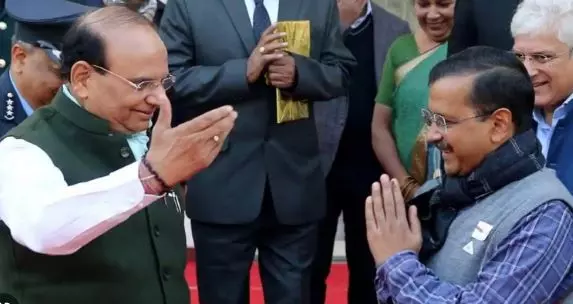
Delhi Govt wins power tussle with Centre over control of bureaucracy
text_fieldsNew Delhi: The Supreme Court has ruled in favour of the Delhi government in a power tussle case with the Lieutenant Governor nominated by the Centre in regard to who owns the executive power to control the bureaucracy in the national capital.
A 5-judge Constitutional bench headed by Chief Justice DY Chandhrachud said that the elected legislatures have the power to control bureaucrats in the administration of services, with the exception of public order, police, and land.
The case was referred to a larger bench in May 2022, following a plea by the Centre seeking the power to make transfers and postings of officers in Delhi as the national capital and the “face of the nation.”
The three-judge Bench, headed by then CJI N V Ramana, had referred the limited question relating to the scope of the legislative and executive powers of the Centre and NCT of Delhi with respect to the term “services” to a Constitution Bench in terms of Article 145(3) of the Constitution. The Constitution Bench comprises at least five judges "for the purpose of deciding any case involving a substantial question of law as to the interpretation" of the Constitution.
The primary contention in the case relates to the interpretation of Article 239 AA(3)(a) of the Constitution, which deals with special provisions for the NCT of Delhi. The May 6, 2022 order noted that the Constitution Bench of the court while interpreting Article 239AA(3)(a) of the Constitution in 2018, did not find any occasion to specifically interpret the impact of the wordings of the same with respect to Entry 41 in the State List (State public services; State Public Service Commission).
The Chief Justice explained that the principle of collective responsibility is affected if officers do not abide by the directions of ministers. The Constitution Bench tackled the question of who has administrative control over transfers and postings of bureaucrats in the capital, and they ruled that the Lieutenant Governor is bound by the elected government's decision on services and the aid and advice of the council of ministers.
However, the Lt Governor's powers do not include administration over the entire Delhi government. The Supreme Court emphasized that if a democratically elected government is not allowed to control its officers and hold them accountable, its responsibility towards the legislature and the public is diluted.























